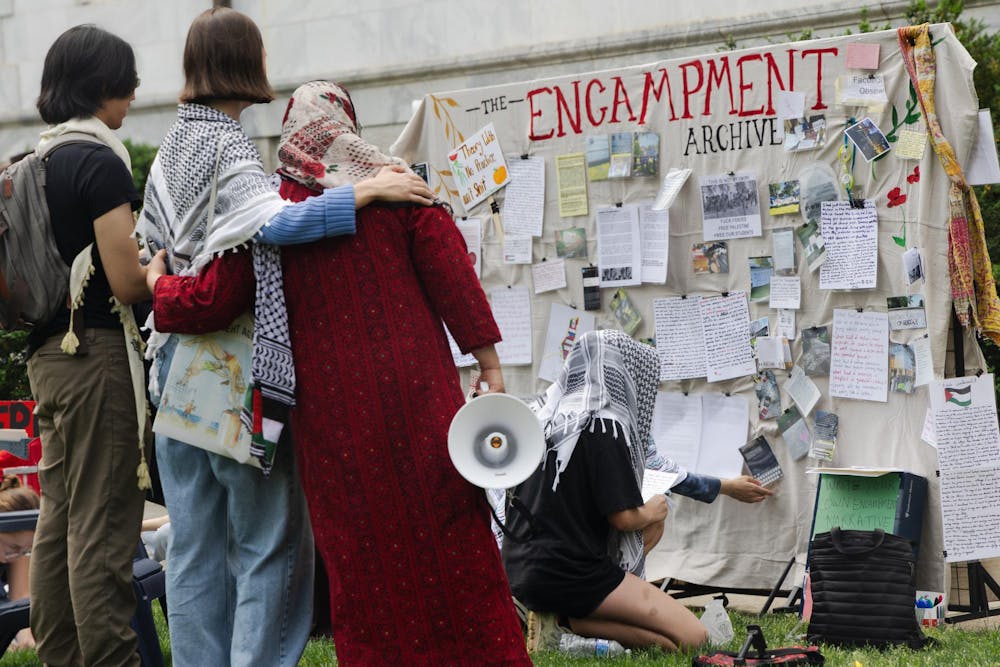All interviewees were kept anonymous out of concern for their safety
A chant rang throughout U.S. college campuses in April 2024: “Disclose, divest, we will not stop, we will not rest.” This demand spread as students gathered to protest the conflict in the Middle East, calling for their universities to sell off their investments in companies with ties to Israel. A year after these protests, Emory University students gathered in Goodrich C. White Hall to reflect on this nationwide wave of resistance, listening to this mantra again at a screening of the documentary “The Encampments.”
Dissenters, an Atlanta community group dedicated to dismantling the war industry and building peaceful global ties, held the screening on April 25, exactly a year after police broke up a pro-Palestine protest on campus.
“The Encampments” centers around the pro-Palestine protests and encampments across U.S. universities in 2024, beginning with the Columbia University (N.Y.) campus occupation on April 17, 2024. Columbia’s protest inspired other global protests, including at Emory.
During the screening, the audience cheered when the documentary mentioned encampments in Atlanta, including those at Emory. The montage of arrests included footage of an Emory professor’s arrest, inciting more fanfare from the viewers who recognized the clip. “The Encampments” also included footage of demolished school buildings in the Gaza Strip, in an attempt to draw connections between American academia and education in the Middle East.
An overarching theme throughout the documentary was solidarity between college campuses. The film highlighted moments at encampments where participants played live music, distributed food and engaged with Palestinian culture.
“The Encampments” also emphasized members of the Jewish community who supported the protests, with the film including a Jewish student encouraging protestors to join in on singing songs and a rabbi speaking to a group of protestors. However, the film also showcased Zionist groups on campuses who counterprotested.
The documentary primarily focused on Columbia University, the primary origin of the encampments. The film crew interviewed Columbia University students Mahmoud Khalil and Sueda Polat, who served as leaders for Columbia’s pro-Palestine movement. On March 8, federal immigration authorities arrested Khalil without a warrant. Immigration and Customs Enforcement is currently holding Khalil in a detention facility in Louisiana.
An “encampment board” was also present in the screening room, which showcased memorabilia and artifacts illustrating the history of protest and resistance at Emory, with some pieces criticizing Emory University President Gregory Fenves.
On April 25 this year, about 50 students, faculty and community members assembled to demand once again that the University divest from Israel and that University President Gregory Fenves resign.
Emory Students for Justice in Palestine member Ibrahim, who attended the film screening, shared that he was glad to have a chance to reflect on and process last year’s protests. Having participated in the previous year’s encampments, he emphasized the importance of keeping the events alive in the collective campus memory.
“The encampment archive is so beautiful, because it's something that we can show to people for many years to come about what happened that day so it doesn't get forgotten,” Ibrahim said.
One audience member, an activist in the Atlanta area, said the film viewing brought them a sense of community and bonding. Beyond that, they said they were “angry,” “horrified” and “deeply saddened” by the ongoing violence in the Middle East. They also had complicated feelings about the fact that while watching a film about the Israel-Hamas war, the audience was eating catered food despite the Gaza Strip’s current hunger crisis.
Am Emory graduate student audience member reflected on the anniversary of Emory’s encampments, she called on the University to end support for “genocide” and to apologize for the “irreparable harm” caused to students.
As a whole, “The Encampments” captures a large moment in student activism and illustrates the stakes of the 2024 encampments.

Kimble Schiller (she/her) (26Ox,28C) is from Houston, Texas and is majoring in economics and philosophy, politics and law. Outside of the Wheel, she can be found studying, hiking, writing for fun, or spending time with friends.










